From Waseda to Fukui: Student-Led Workshop Tackles Unconscious Gender Bias in Rural Japan
Tue, Jul 22, 2025-
Tags
A team of international students from the Transnational and Interdisciplinary Studies in Social Innovation program (TAISI) at Waseda University organized and led an exchange workshop for high schoolers in rural Fukui, Japan. The event, focused on gender, sexuality, and unconscious bias, directly applied their academic passions to bring academic discourse on gender and opportunity to rural Japan.
The workshop combined quizzes on societal norms, a mini-lecture, and immersive discussions designed to examine conservative and rural perspectives while providing English communication practice and giving participants the chance to experience a Waseda classroom environment.
The Workshop
Titled ‘Waseda x Fukui: Collaboration Workshop with High Schoolers “Questioning societal norms from a gender perspective”’ the workshop was hosted on June 28th and 29th and led by Mana Nakagaichi, a 3rd year Waseda student at the School of Social Sciences. Guided by her seminar professor, Professor Saori Kamano and aided by project members Mei Sasaki (Japan), Nari Culos (USA), and Vera Ahnlund Berg (Sweden), Mana (Japan) focused the workshop on the topic of gender and sexuality. The topic not only aligns with Prof. Kamano’s seminar but also with the student organizers’ own personal interests. The core theme was「モヤモヤの正体」(Moya-Moya no Shōtai, “The True Shape of Your Unease”). The workshop focused on dissecting everyday discomforts about societal norms, especially ones surrounding gender and sex.
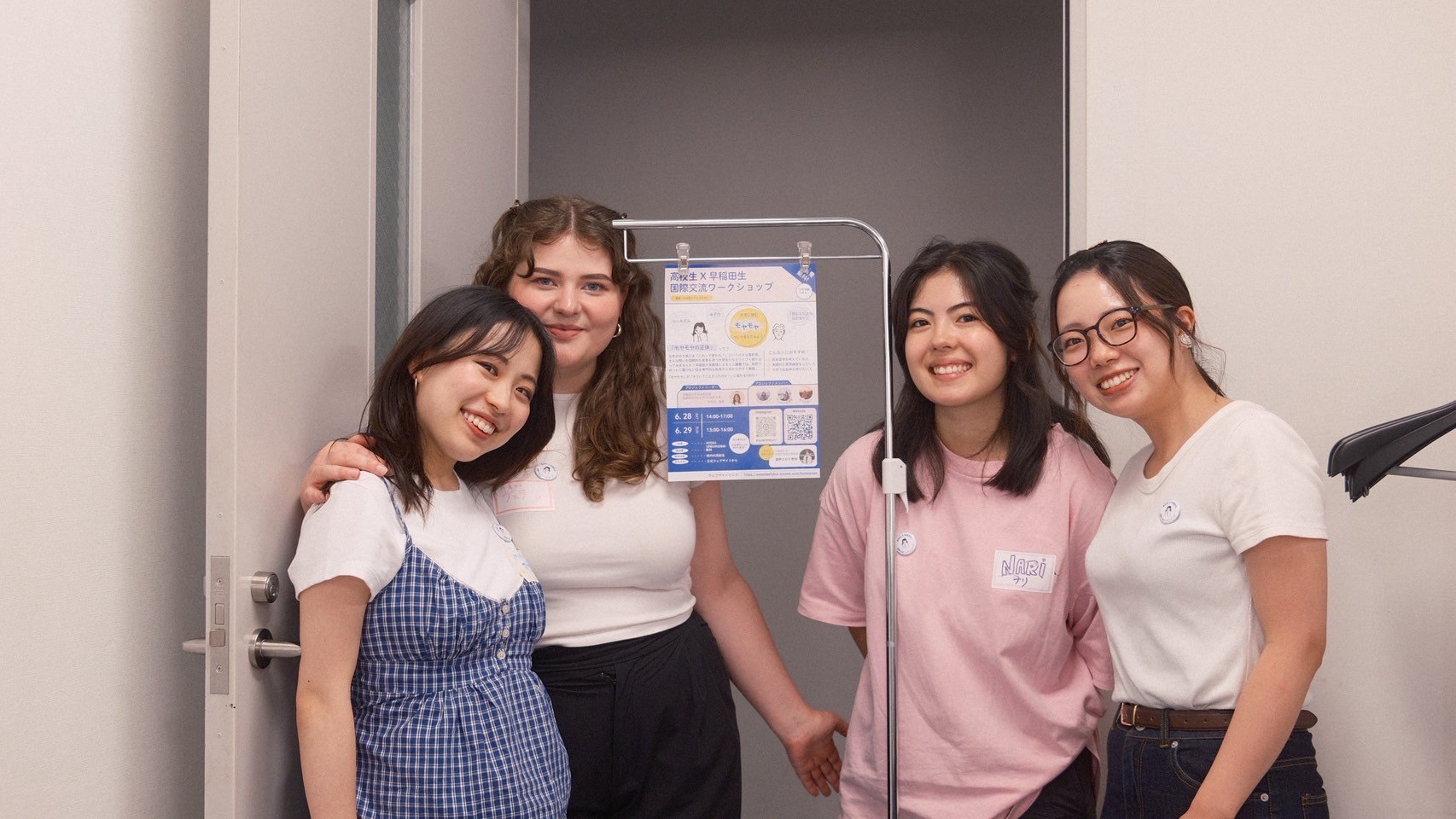
Workshop organizers left to right: Mana, Vera, Nari, Mei
During the interview for this article, Mana revealed that organizing this workshop was deeply personal. Inspired by her own journey of growing up in rural Fukui, attending high school in the US, and now studying at Waseda, Mana recognized how geography shapes opportunity. “My friends in Fukui wanted to join international cultural exchange events but could only access them in distant cities,” she shared. “So, we thought we could bring Waseda’s academic resources and environment to students who couldn’t come to us.”
Moreover, by taking into account the mission of TAISI, an English-based degree program offered by the School of Social Sciences, this workshop epitomizes TAISI’s mission by transforming academic discussions into actionable fieldwork that bridges cultural divides and empowers the communities. Encouraged by the University’s call to “apply what we learn onto the field,” Nari commented that “confining our discussions on this topic to the classroom reflect neither our deep passions nor the University’s mission.”
Targeting local Fukui high schoolers addressed a critical academic gap. “Many can’t afford to travel to Tokyo for open-campus events,” noted Mana. Many high schoolers are preparing for university and, according to the organizers, this was a chance for them to experience what university learning is like. Furthermore, Fukui’s conservative and rural context made it ideal. “Societal norms feel absolute until you see alternatives,” explained Nari.
In addition, previous online programs in Fukui connected Mana with many high school students, some of whom were interested in gender studies. These interactions solidified her commitment to creating an event that bridges academic gaps, raises awareness, and taps into the students’ inherent curiosity.
Workshop Content
“We wanted students to question why these gender norms exist, not just accept them,” said Mana and Nari as they explained how, based on their experiences living in various countries, gender norms vary globally. Therefore, the team designed discussions to challenge gender and sexuality norms in a region where conservative values often limit conversations about gender and sexuality. Examples like lookism (appearance-based discrimination), “boys don’t cry” stereotypes, and “girl power” marketing were chosen because they resonate with high schoolers’ lived experiences of gendered hair rules and hidden gender biases in academic curriculums.
The workshop flowed dynamically through these interactive modules:
- Introductions: organizers introduced themselves and the program and laid down ground rules that emphasized respect and confidentiality.
- Breaking the ice: students practiced approaching other peers to overcome shyness to encourage engagement and conversations.
- Busting biases: a series of quizzes were played to reveal unconscious stereotypes and get students comfortable with the idea of discussion, e.g., a surgeon riddle (“Why can’t a surgeon operate on a child?” Answer: “The surgeon is his mother.”) revealed ingrained biases.
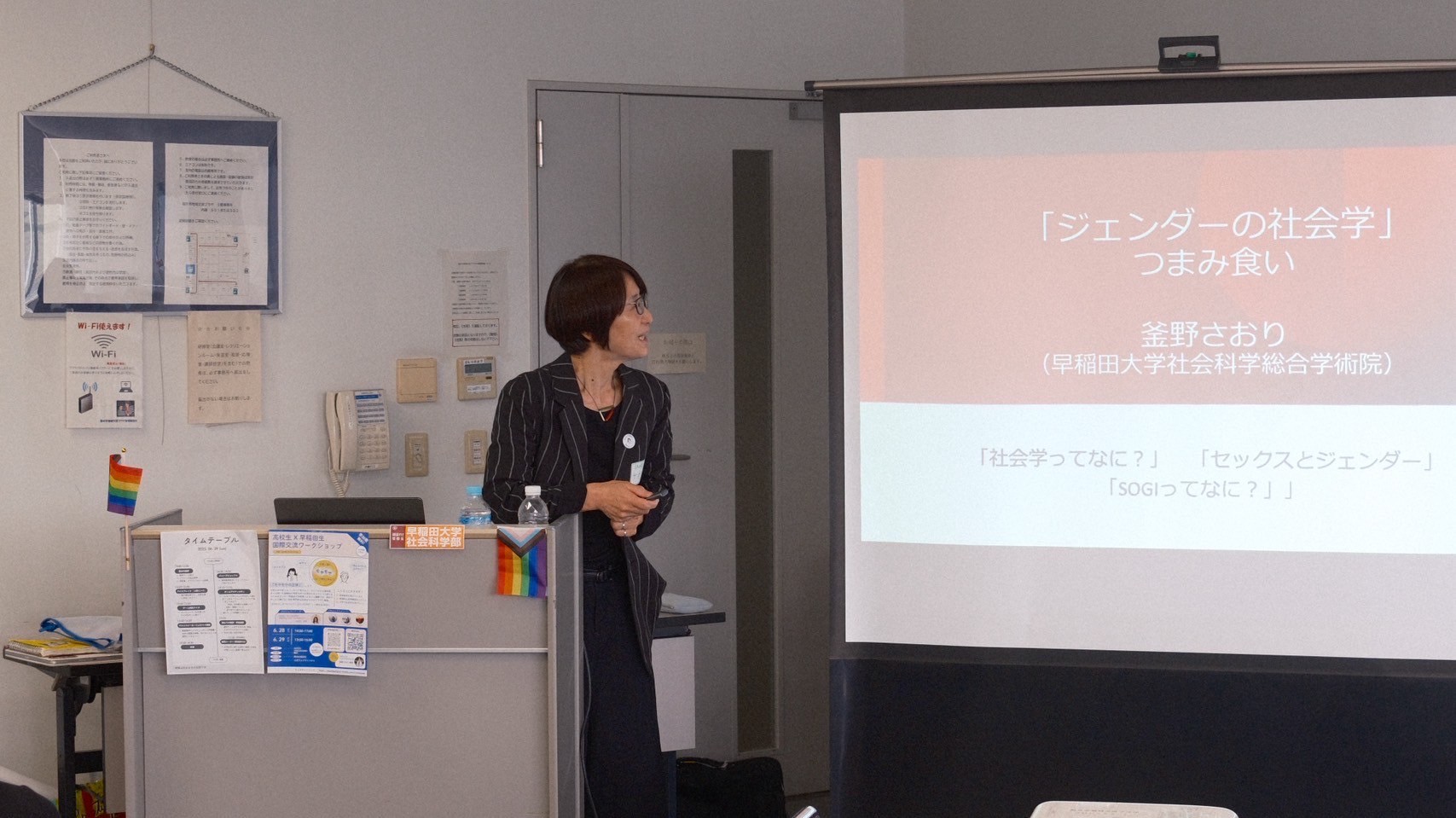
Professor Kamano giving the mini-lecture
- Building an academic foundation: a mini-lecture by Prof. Kamano covered foundational concepts on Sociology, the differences between sex and gender and sexual orientation and gender identities (SOGI). Originally three separate 100-minute lectures, Prof. Kamano skillfully compressed and simplified them into palatable presentations suitable for high schoolers.
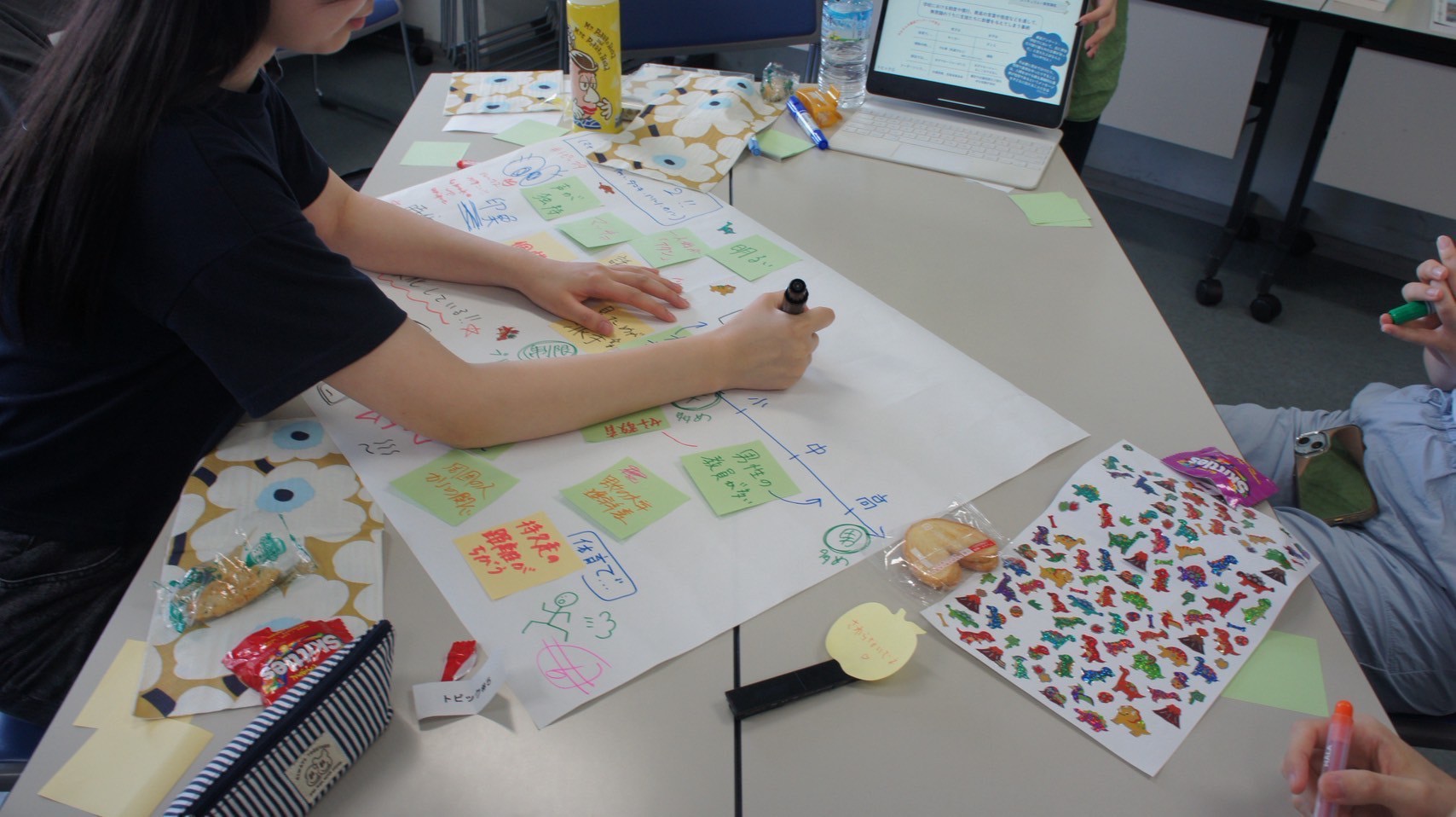
Students filling in the sheet during the small group discussions
- Deep dives via small-group discussions: students were separated into small, intimate groups, facilitated by 1 – 2 organizing members, to discuss at their own pace and depth. Out of ten topics, only a few are drawn at random. Sketches and sticky notes were used to encourage deeper analysis and an interactive and engaging discussion that not only teased out students’ intimate thoughts but also simulated a college environment.
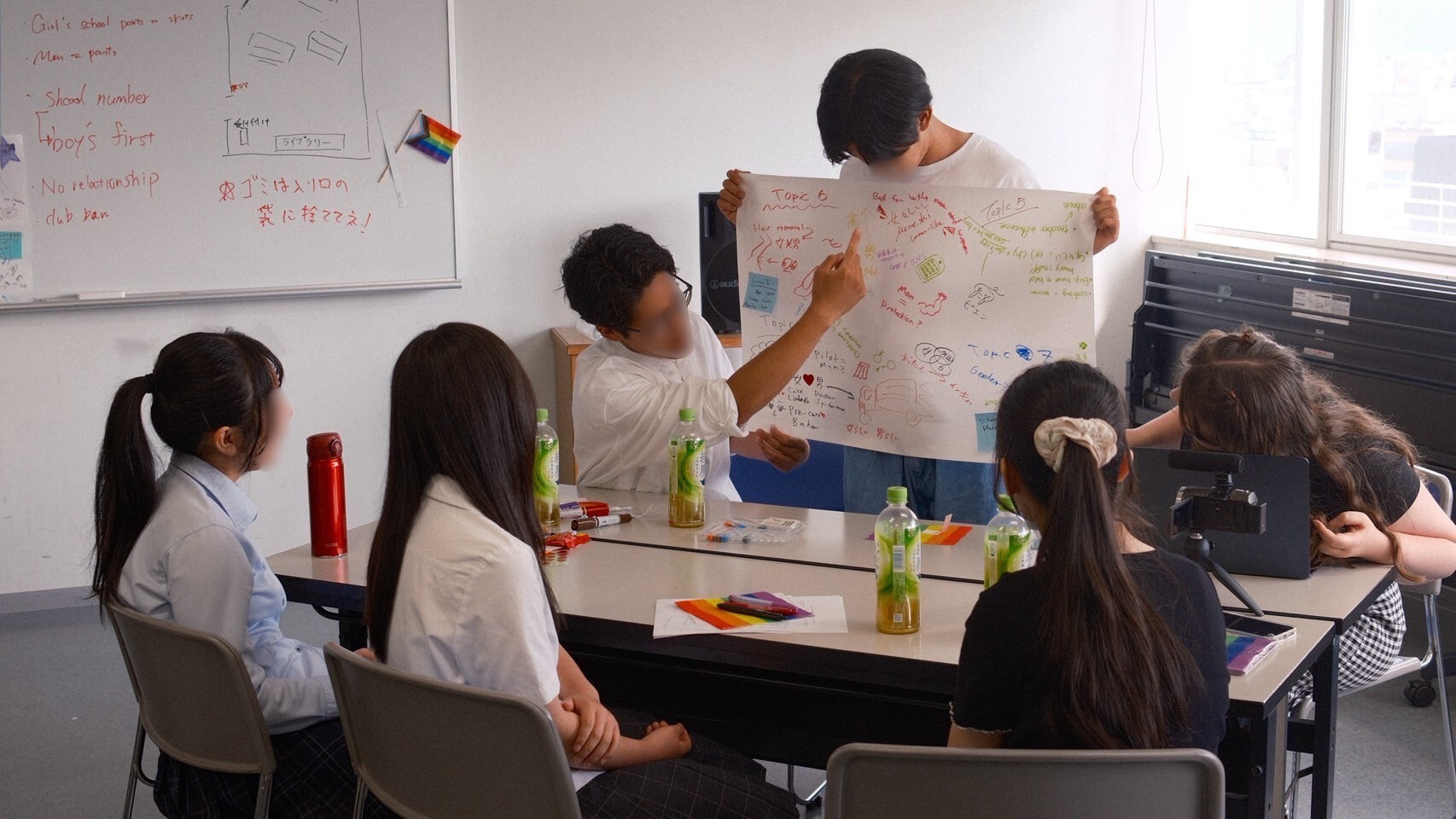
Students sharing their dicussion points during the wrap-up
- Wrapping up: students shared their discussion and learnings.
- Informal Q&A: a candid Q&A session where students were given the opportunity to talk, one-on-one and on a personal level, with the organizers and Prof. Kamano about university life, applying to urban colleges, and career paths.
Challenges and Triumphs
Recruiting participants was arduous as the workshop took place during finals season. Mana had to cold-call many schools and mail posters, as schools in Fukui are still ‘paper-heavy’, and leverage local newspaper ads. Key support arrived from a childhood friend, who helped coordinate with educators and students while managing on-site logistics. Further aid came from two high schoolers who refined the materials for easier understanding by their peers.
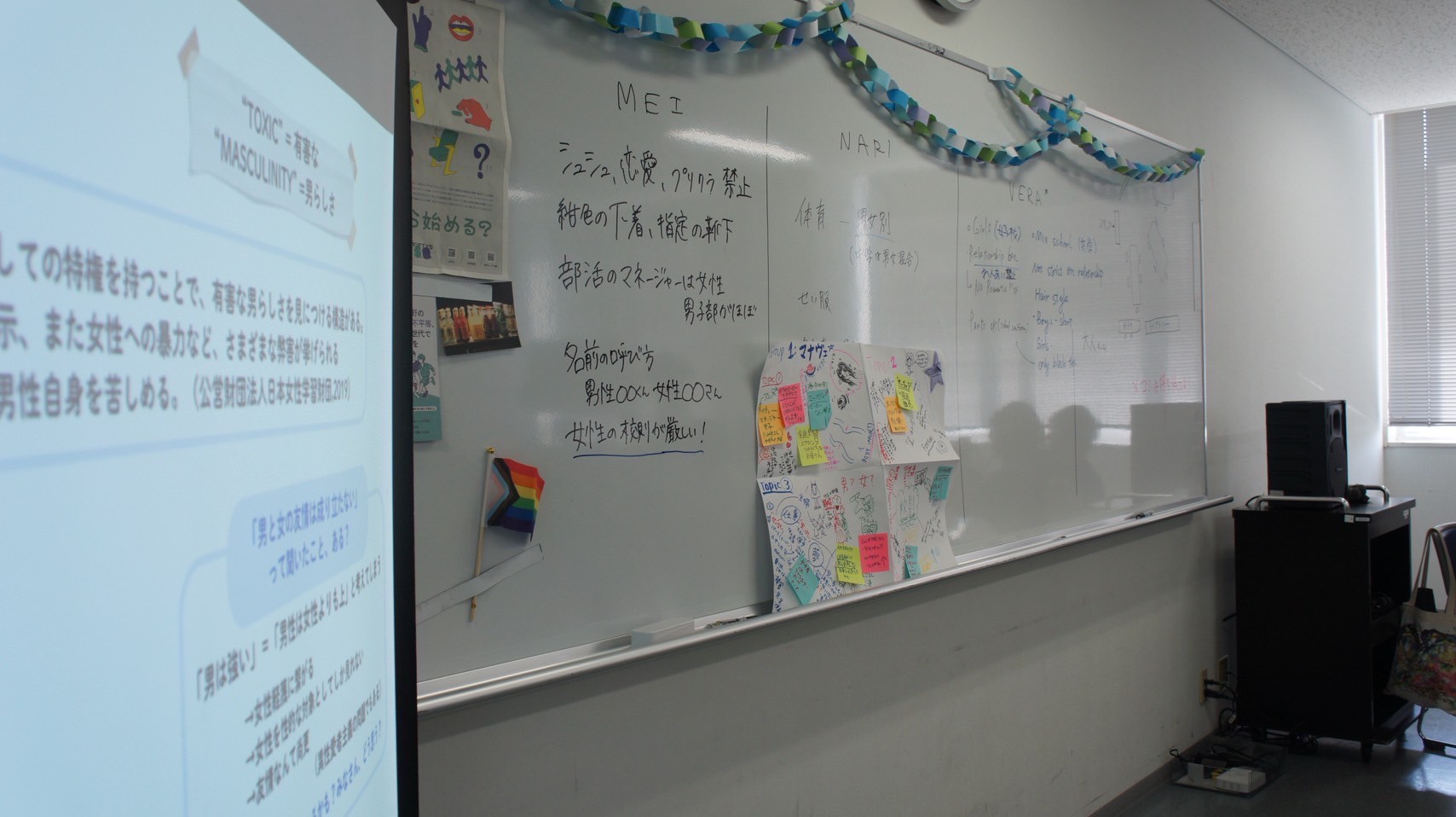
The whiteboard at the end of the workshop
Thanks to the team and their volunteers’ hard work, 20 students (80% female) participated across the two sessions. Reflecting on the turnout, which was lower than initially anticipated, Nari stated that ’20 turned out to be a good number’ as it allowed for productive discussions yielding genuine and personal insights from the students.
Feedback reveals further success:
“I never thought about gender and sexuality before and I realized it’s actually good to have an opinion about them.”
“This made me want to study sociology.”
“Please make us use more English next time!”
Moreover, the post-workshop survey also revealed that students were open to learning more about broad multifaceted topics like sexual minorities and ‘taboo’ ones such as sex education and sexual violence. “We kind of influenced their mindset,” Mana remarked at the change, “which is great!”
Through this event, the organizers also learned a lot. Mana, reminiscing about her past in Fukui, confided that Fukui has changed for the better. “The students said they don’t experience any homophobic or transphobic slurs,” she noted. Meanwhile, Nari expressed surprise at how “the students were just so willing to participate, to learn and explore” topics they are not familiar with.
Based on their reflections, the biggest takeaway they hoped students gained was the empowerment to critically question everyday societal norms and structural inequalities, particularly those related to gender, regional opportunity gaps, and unconscious biases. Nari hoped that questioning such norms helps students “choose their futures, not inherit them” from their parents, the news, and the restrictive social environment.
What’s Next
Buoyed by demand (70% of participants want repeat events!), the team is motivated to host more events.
Although nothing is set in stone, there are discussions about expanding to other areas of Fukui and hosting more frequent sessions. There are talks of collaborations between other seminars from the University as well. Meanwhile, Mana is contemplating integrating this workshop into her graduation thesis, leveraging data from pre/post-workshop surveys.
“Seeing students have ‘lightbulb moments’ was our greatest reward,” Mana concluded as she expressed her excitement to conduct more workshops.
This Waseda x Fukui workshop stands as a compelling testament to the power of student-led initiatives and international dialogue. By creating a safe space for high schoolers to critically examine ingrained societal norms surrounding gender, sexuality, and opportunity, the project achieved its core mission of empowering youth to identify and question gender-based societal norms. The overwhelmingly positive feedback and popular demand for future sessions underscore its success in sparking curiosity, shifting perspectives, and opening doors to academic fields like sociology. Ultimately, this initiative transcends a single event; beyond bringing awareness to niche topics such as gender and sexuality to rural Japan, this workshop also exemplifies how Waseda University students can leverage their international experiences to drive tangible change beyond institutional walls, turning “classroom passions” into tools for societal progress.
This article was written by the following Student Contributor:
Srey Sokuncharia
Graduate School of Creative Science and Engineering













